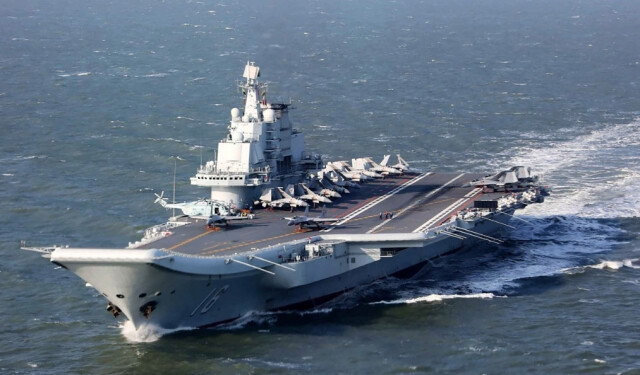
TAIPEI, Taiwan – Amid escalating tensions between Taiwan and China, the Chinese People's Liberation Army (PLA) reportedly maintained a continuous deployment of two aircraft carrier strike groups and dozens of warships around Taiwan throughout May, significantly intensifying military pressure on the island. This move is interpreted as China blatantly revealing its ambition to effectively transform the 'First Island Chain,' which it claims, into its own territorial waters.
Taiwan Security Official Warns: "China Deploys an Average of 70 Warships Daily"
A Taiwanese security official told the Eurasian Times on June 2 that an average of up to 70 Chinese naval vessels and government ships were detected daily from the West Sea to the South China Sea between May 1 and 27. The official, who requested anonymity, added that China has consistently ramped up its deployment of fighter jets and warships around Taiwan in recent years to assert its sovereignty claims over the island.
China has repeatedly threatened Taiwan, publicly stating that it will never rule out the use of force for "reunification." This large-scale military deployment is seen as a further escalation of these threats.
"More Provocative Than Before"… "Comprehensive Maximum Pressure" on All of Taiwan
The Taiwanese security official characterized China's military actions and 'gray zone activities' as "comprehensive maximum pressure, including large-scale deployments across the entire Taiwan archipelago." He explained that China "continued sustained harassment operations, with an average of 50-70 naval and government vessels, and hundreds of sorties by various military aircraft, daily," emphasizing that China's activities were "even more provocative than previously observed."
Notably, some Chinese vessels reportedly passed through the Miyako Strait, between Miyako Island and Okinawa Island in Okinawa Prefecture, Japan, to conduct 'long-range exercises, including air-sea joint training' in the Western Pacific. This suggests that the Chinese Navy is intensifying its training for projection into the Pacific Ocean, which could be interpreted as a threat to the U.S.-Japan alliance and regional security. According to Taiwan's Ministry of National Defense, a total of 75 Chinese aircraft conducted three 'combat readiness patrols' near Taiwan in May alone.
Ambition to 'Internalize the First Island Chain,' Coinciding with Lai Ching-te's Inauguration Anniversary and the Shangri-La Forum
The 'First Island Chain' claimed by China extends from Okinawa, Taiwan, and the Philippines, reaching into Korea's Yellow Sea. South Korea, Taiwan, and the Philippines are all strong allies of the United States, playing crucial roles in expanding U.S. influence in the region. China's large-scale deployment of warships around this First Island Chain is not merely seen as a threat to Taiwan, but as a strong demonstration of its intention to effectively make the First Island Chain its own inland sea. This is interpreted as part of China's long-term strategy to expand its military influence in the Western Pacific.
The timing of China's massive military deployment is also noteworthy. It coincided with the first anniversary of Taiwanese President Lai Ching-te's inaugural speech on May 20 last year, and also with the annual Shangri-La Dialogue, an security forum held in Singapore last weekend.
This forum, also known as the Shangri-La Dialogue, is an important gathering where key defense and security officials from the Asia-Pacific region discuss regional security issues. At the forum, U.S. Secretary of Defense Lloyd Austin strongly criticized China, stating that "China is preparing to use military force to overturn the balance of power in Asia." In response, China did not send its Defense Minister Dong Jun to the forum, but instead warned the U.S. not to "play with fire" on the Taiwan issue, maintaining a hardline stance. This reaffirms China's determination to consider the Taiwan issue as a core interest and tolerate no external intervention.
Heightened Regional Security Instability… Intensification of US-China Conflict Inevitable
This large-scale Chinese military action is expected to further heighten regional security instability surrounding the Taiwan Strait. In particular, with China blatantly revealing its intention to 'internalize the First Island Chain,' it is highly likely to provoke strong opposition from the United States and its regional allies. The U.S. supports Taiwan's self-defense capabilities through the Taiwan Relations Act and plays a crucial role in maintaining peace and stability in the Taiwan Strait.
Such provocative actions by China are likely to further intensify strategic competition between the U.S. and China, and significantly impact the overall security landscape of Northeast Asia and the Western Pacific. As South Korea is also included in the First Island Chain, there is an increasing need for it to closely monitor this situation and make diplomatic efforts to de-escalate regional tensions. The future of the Taiwan Strait is not merely a matter for Taiwan and China alone, but has emerged as a critical issue directly linked to the peace and stability of the entire international community.
[Copyright (c) Global Economic Times. All Rights Reserved.]




























